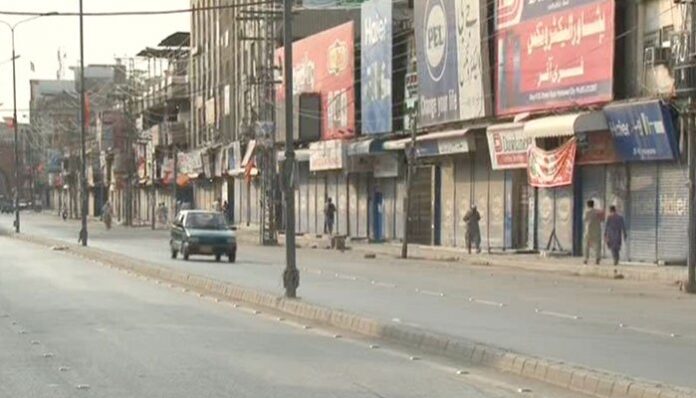ISLAMABAD: In an unusual display of unity, traders, small businesses, and even several national clothing brands joined the shutter-down strike in the federal capital on Wednesday. Additionally, meat shops were closed for their weekly day off.
Unlike previous protests, this strike saw participation from tea stalls, local restaurants, and tandoors in response to the ‘Tajir Dost Scheme’ launched by the Federal Board of Revenue (FBR).
Several political parties, including Jamaat-e-Islami and JUI-F, have also voiced support for the traders’ cause, calling the strike justified. Ajmal Baloch, head of the All Pakistan Traders’ union, labelled the FBR as a corrupt and dishonest department.
Speaking to the media on Tuesday, Baloch announced that a complete shutdown would occur nationwide on Wednesday, August 28, in protest against the government’s economic policies and tax regulations. He, along with Shahid Ghafoor Paracha, President of Anjuman Tajiran Punjab, and Chaudhry Muhammad Farooq, President of the All Pakistan Restaurants Association, confirmed that the strike would proceed as planned, dismissing rumours of negotiations with the government.
Baloch refuted claims of ongoing discussions between traders and the government, asserting that the strike would only be called off if an official notification reinstating the trader-friendly scheme is issued. He warned that the strike could be extended indefinitely if the government fails to meet their demands.
Why are the traders angry?
Despite government threats and notices, traders were united in their decision to shut down the country from Khyber to Karachi on August 28. “This strike is a protest against increased electricity bills and unjust taxes,” they asserted.
The traders highlighted the severe financial strain they are under, struggling to pay shop rents and school fees. They suggested that the wealth of the elite should be used to pay off Pakistan’s debt, expressing outrage that while the public is taxed even in death, the rulers continue to squander tax money on luxuries.
Most prominently the protest was against the latest provisions of the Tajir Dost Scheme, under which the government has decided to collect an advance income tax from traders on their “indicative” income, based on the area of their operation, irrespective of their business’ financial health and performance
Indicative income refers to an estimated income level determined by the tax authorities based on various factors such as the rental value of the property, its location, and its fair market value.
After repeated attempts of widening the tax net, the FBR recently came up with this system under which most of the businesses would be taxed, including stall owners.
According to FBR’s SRO 1064(I)/2024, income tax authorities now also have the power to impose penalties and enforce compliance measures, which could include prosecution proceedings if the non-compliance breaches a certain threshold.
The strike
“Apart from major food chains, we requested branded clothing outlets and other stores to participate in the strike, and they responded positively,” said Abdul Rehman, president of the Traders Welfare Association in F-7 Markaz while talking to Profit.
The strike extended to high-end markets including the Blue Area and F-6 Markaz, with noticeable effects in both low and mid-level markets throughout the capital city and its neighbouring city of Rawalpindi. The Nanbai Association’s support meant that nearly all tandoors in the city were also closed on Wednesday.
Supporters of the two main rival traders’ bodies, Markazi Tanzeem-e-Tajran Pakistan and Anjuman Tajran Pakistan, were seen patrolling the markets to ensure compliance with the strike call.
Traders’ leaders described the shutter-down strike as a referendum against the FBR’s practices. “We demand government reforms to address the trust deficit between taxpayers and the FBR,” said Ajmal Baloch, president of Anjuman Tajiran Pakistan. He added, “No one is against paying taxes or being in the tax net, but can anyone, including the prime minister or the army chief, guarantee that FBR officials will not harass industrialists and importers?”
The strike also led to a decrease in local transport services, with fewer commuters than usual.
























